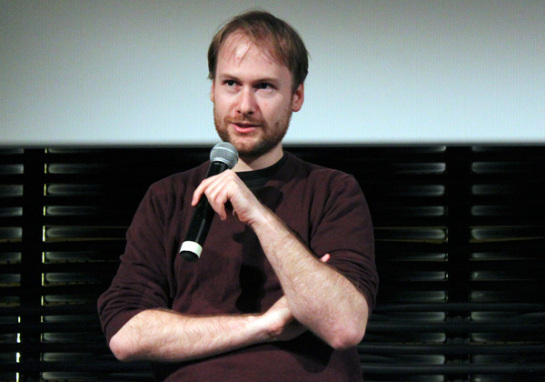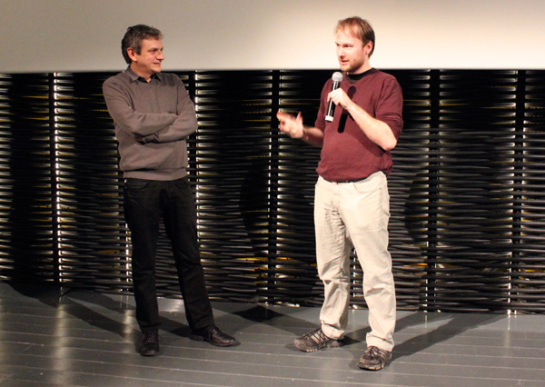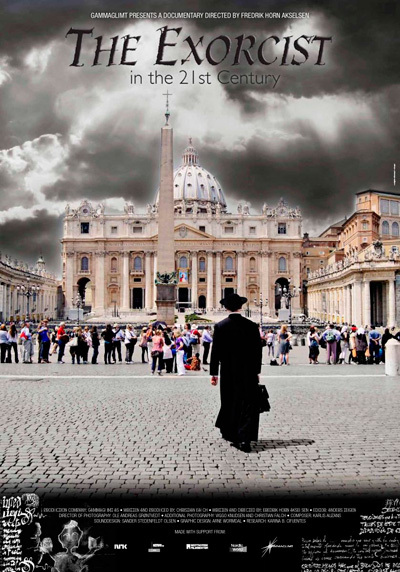Robero Cueto y Fredrik Horn Akselsen en el coloquio en CINETECA (Madrid) después del pase de «The Exorcist in the 21st Century» (Video: max)
![]()
THE EXORCIST IN THE 21ST CENTURY Frederik Horn Akselsen / 80´ / 2012 / Noruega
Este documental, presentado en el Festival de Cine de Sitges, se adentra en los dominios de la Iglesia Católica de la mano de uno de los pocos exorcistas que existen en Europa, José Antonio Fortea, que viaja por el mundo siempre alerta de posesiones demoníacas. Esto lo lleva hasta Constanza, una mujer colombiana que afirma llevar quince años de convivencia con los demonios.
El director: Fredrik Horn Akselsen estudió cine en la NTNU noruega y en la QUT australiana. Debutó con Treason and Sabotage, presentado en el festival Kosmorama. The Exorcist in the 21st Century es su segundo largometraje. CINETECA

Fredrik Horn Akselsen en CINETECA (Foto: max)
SINOPSIS: Este documental se adentra en los dominios de la Iglesia Católica de la mano de uno de los pocos exorcistas que existen en Europa, José Antonio Fortea, que viaja por el mundo siempre alerta de posesiones demoníacas. Esto lo lleva hasta Constanza, una mujer colombiana que afirma llevar quince años de convivencia con los demonios. The Exorcist in the 21st Century se acerca a uno de los temas estrella del terror en una de las aproximaciones más realistas que hayamos visto nunca. (FILMAFFINITY)

Robero Cueto y Fredrik Horn Akselsen en CINETECA (Foto: max)
The creators of Exorcist in the 21st Century discuss exorcism and Catholicism in modern society.
Exorcist in the 21st Century is a documentary about exorcism. Not a mockumentary, not a fictionalized account “based on a true story.” It is an honest look at the modern practice of exorcism, those who believe they are possessed by demons and those who believe they have been empowered by God to expel demons from the possessed.
Following Father José Antonio Fortea, Spanish priest and exorcist superstar, the film depicts a man confident in both his faith and ability to save. Parallel to the father, Exorcist tells the story of Constanza, a Columbian woman who believes she has been possessed for over 15 years.
While Hollywood is concerned with dramatizing accounts of possession, two Norwegian filmmakers thought to look past the sensationalism and earnestly examine the modern use of this ancient ritual.
That is perhaps the most surprising aspect of this film. What would drive two Scandinavian, self-proclaimed humanists, to create a documentary that looks objectively and sincerely at a practice that most religious practitioners shy away from?
To find out, CultureMap sat down with the film’s director, Fredrik Horn Akselsen, and producer, Christian Falch, after their world premiere Saturday night at Fantastic Fest.
 CultureMap: I was surprised to see two nonreligious guys made a film about exorcism. What drew you to that aspect of religion?
CultureMap: I was surprised to see two nonreligious guys made a film about exorcism. What drew you to that aspect of religion?
Fredrik Horn Akselsen: It was surprising to us that exorcism was still being done, because Norway is a very secular country, and realizing that there were still exorcisms happening in Norway. Then we found out that you have exorcists that are superstars in the world, we found that even more interesting.
Christian Falch: The dark side of life, and religion, from a very early age, has always fascinated us both. Exorcism is something we only knew about from Hollywood. We both love history and religion in society, it’s an exciting topic.
CM: Christian mentioned that you both held pagan beliefs. Has the experience making this film altered your belief system at all?
FA: To start, I think pagan is a little wrong; it’s more humanist than anything. I never believed in Thor or Odin or anything, but I don’t know about Christian [laughs].
There were times that I really had to think about it, and it really was a journey. I didn’t grow up in a Christian home, so for sure there were a lot of questions I had to consider. In the end, I didn’t see enough proof of supernatural or religious phenomenon that I would say, oh sure there’s witches and demons and angels at play.
CF: I also am a nonbeliever. I do have a more open mind than Fredrik, though. I’ve always believed in ghosts, and if you believe in ghosts you have to believe in something more. But I have no need to define it; I don’t want to define it. I just am happy with thinking there’s something more.
During this process, it’s been like three years with a catholic priest and no one has converted us, but the positive thing is I respect faith a little more. I understood how much faith can mean to people, and it’s really very important to millions and millions of peoples every day lives.
CM: Christian, how did you find yourself helping Father Fartea during exorcisms, and how did that lead to making the film?
CF: I found out about this guy on the Internet, and found out his diocese is right outside Madrid, so I went there on vacation. I was just supposed to speak with him and before I knew it, he invited me to a ritual to be his bodyguard.
I guess he assumed I was a Catholic. He didn’t ask me anything and just dragged me with him. I think I did a great job [laughs]. So we continued for like five days, me being his bodyguard, and on the sixth day I asked him, very gently, if he’d like to participate in our movie.
FA: Yeah, Christian went to Madrid and became the Padre’s bodyguard. We chose to do it, more or less, objectively. To present the world and show the audience a world foreign to most people. Not to be overly critical, or not to be overly evangelical.
CM: During any of the rituals, did you ever experience any kind of supernatural presence?
CF: I can’t deny that the atmosphere in the room of an exorcism is very peculiar. It’s kind of scary… It’s like nothing I have ever experienced. But the supernatural phenomena did not occur. It’s not a common thing, but it could be speaking foreign languages, or having super human strength, or levitation, even. But that’s really rare and we didn’t get to see anything like that.
FA: The most scared I was, was during an incident with Constanza at the hotel. It came so unexpectedly. The photographer had actually turned off the video camera, so I turned it back on because I had the feeling that something might be happening. And she had this reaction on camera, and that was scary and a bit surprising. That was the first time we had seen anything like it and it made me think, “What’s going on here?”
CM: I’d like to talk a bit about Father Fortea. He seems genuine, but a little self-obsessed, in a way. Did you guys notice anything like that while making the film?
FA: For sure, many things, just being around him. You got the impression that he was very accustomed to people being intrigued by him. In that way, I think he found it refreshing to be around us, who didn’t have that sort of religious reverence for him. It was more that we were able to be human around him.
CF: He’s a priest, so people automatically look up to him, so he’s like a natural born authority, and on top of that comes his fame. So, it would be strange if that did not affect his personality. But he treated us very nice, treated us like friends. I’ve seen rock stars acting way worse than he did.
CM: Fortea mentions out of the 46 million people in Spain, he’s the only priest certified to perform exorcisms. What do you think that says about the Catholic Church’s stance on the ritual?
FA: We saw some evidence of the church wanting to separate from exorcism. Fortea is fighting a losing battle in many ways. The strange thing is, on a popular level, exorcisms are quite common. The modern Catholic Church seemed to be kind of skeptical about the ritual.
CF: We thought that when entering the Catholic Church we would be treated like outsiders, like pagans and they would close the doors on us. We were afraid of nuns — we thought they were scary, like hitting you with a stick and stuff.
But they welcomed us. Everywhere we went they treated us like friends. We had a really positive church with the clergy.
CM: Did that welcoming attitude alter your perception of the church at all?
FA: Not really, because of everything else around the church. We met nice people, but I didn’t expect people that were Catholics were evil just because they were Catholics. I met nice people and I also met people that weren’t nice.
CM: Lastly, because I’ve never met an actual Norwegian, I have to ask: What are your top three metal albums of all time?
CF: Okay, on top, there is the Emperor album Anthems to the Welkin at Dusk. That’s the most perfect, divine record. You cannot change a single tune on it. It’s just perfect. And then comes a German band called Blind Guardian, their album Nightfall in Middle Earth. It’s like epic, power metal, J.R.R Tolkien kind of stuff.
Third, I would have to say, if you can call it metal, Guns N Roses’ Appetite of Destruction. You can’t move past that one, it’s been with me my whole life.
I’m actually making another documentary about metal — hopefully we’ll see it at Fantastic Fest 2015.

I must thank you for the efforts you’ve put in writing this blog. I’m hoping to check out the same high-grade content from you in
the future as well. In fact, your creative writing abilities has encouraged me to get my own, personal blog now.
Me gustaMe gusta